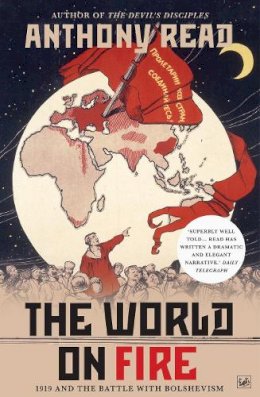
The World on Fire
Anthony Read
At the 1919 Paris Peace Conference, Western leaders drafted a peace treaty that would punish German militarism and 'make the world safe for democracy' but the world itself was already fighting a new war, against terrorism. The great evil was now Bolshevism, which had burst onto the scene in 1917 and rapidly seared itself into the world's consciousness.
The Allied powers' attempts to destroy this threatening ideology at its source by intervening in the Russian civil war were both unsuccessful and controversial and the tremors of the Russian upheaval eighteen months earlier were being felt throughout the world, resurfacing in bloody revolutions and even bloodier counter-revolutions in Germany, Hungary and the Baltic States, as well as in the massive strikes, riots and civil unrest that paralyzed the rest of the world.
Military revolts involving thousands of British personnel saw a group of sailors imprisoned for taking over their ship, hauling down the white ensign and hoisting the red flag in its place, while in Ireland Michael Collins and the IRA were conducting a successful terrorist campaign against the British; in Italy Benito Mussolini deserted the socialist camp and drew up the Fascist Manifesto; and in the United States a series of terrorist bombings, later labelled the Great Red Scare, created a wave of hysteria that shook the very foundations of a free and democratic society.
Anthony Read's absorbing and revelatory book chronicles and examines the running battle with Bolshevism, insurgency and fear during the most revolutionary year since 1789.
Product Details
About Anthony Read
Reviews for The World on Fire
Daily Telegraph
A thrilling account of a brief historical moment in which world revolution seemed an attainable dream
Scotsman
Well-written, intriguing and nicely-produced book
Sunday Herald
Impressive in geographical scope and rife with incident
Sunday Telegraph
Read's mastery of his materials is truly a marvel, and as he unscrolls his highly detailed accounts from far corners of the globe, the narrative gains a cumulative impact that is potent and liberating. ... Every reporter should have to read this book and mull over certain similarities to present-day group behaviour
San Francisco Chronicle
